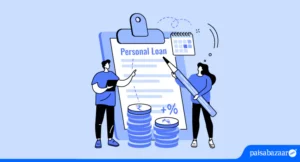What are the eligibility criteria to get a personal loan
Banks and NBFCs usually consider the credit score, age, occupation profile, job/business stability and employer’s profile of the applicant for personal loan applications. The eligibility criteria also depend on the internal policies of the lender. Stated below are the personal loan eligibility criteria usually set by most lenders for their salaried and self-employed applicants:-
Eligibility Criteria for Salaried and Self-Employed Applicants
| Eligibility Criteria | For Salaried Applicants | For Self-Employed Applicants |
| Age Limit | 18 – 60 years | 21 – 65 years |
| Minimum Income | Usually Rs 15,000 p.m. | Usually Rs 15 lakh p.a. |
| Minimum Work Exp./ Business Continuity | Usually 1 year, with some lenders requiring longer work experience. | Usually 3 years of business continuity, with some lenders requiring a longer period of business continuity |
| Credit Score | Preferably 750 and above | |
Personal Loan Eligibility Criteria of Top Banks & NBFCs
| Lenders | Eligible Loan Amount | Minimum Eligible Income | Eligible Age |
| State Bank of India | Up to Rs 35 lakh | Rs. 20,000 per month | 21-60 years |
| Axis Bank | Up to Rs 10 lakh | Rs. 15,000 per month | 21-60 years |
| HDFC Bank | Up to Rs 40 lakh | Rs. 25,000 per month | 21-60 years |
| ICICI Bank | Up to Rs 50 lakh | Rs. 30,000 per month | 20-65 years |
| IDFC FIRST Bank | Up to Rs 10 lakh | – | 21-60 years |
| IndusInd Bank | Up to Rs 50 lakh | Rs. 25,000 per month | 21-65 years |
| Kotak Mahindra Bank | Up to Rs 35 lakh | Rs. 25,000 per month | 21-60 years |
| Moneyview | Rs 5,000 – Rs 10 Lakh | Rs. 13,500 per month | 21-57 years |
| Tata Capital | Up to Rs. 50 Lakh | Rs. 15,000 per month | 16-65 years |
| SMFG India Credit Company Limited | Up to Rs 5 Lakh | Rs. 25,000 per month | – |
| YES Bank | Rs 1 Lakh – Rs 40 Lakh | Rs. 25,000 per month | 21-60 years |
Eligibility Criteria for Pre-Approved Personal Loans
- Lenders usually extend pre-approved personal loan offers to their existing customers with good repayment history and strong credit profiles.
- Most banks and NBFCs consider loan repayment history, recent salary credits, existing loan obligations, account balance & transaction pattern, etc. before offering you a pre-approved personal loan.
- Pre-approved offers are ‘Invitation to Apply’ and therefore do not guarantee final approval. Such offers can increase your chances of personal loan approval, but applicants still have to undergo an evaluation process. This may include additional checks and documentation based on the lender’s policies.
How Do Lenders Decide Your Maximum Personal Loan Eligibility Based on Your Salary
Most banks and NBFCs consider two methods, the multiplier method and the EMI/NMI ratio, to calculate the applicant’s eligible personal loan amount.
Multiplier Method
In the multiplier method, an applicant’s Net Monthly Income (NMI) is multiplied by a set number to calculate an applicant’s personal loan amount eligibility. This multiple can be anywhere between 10 to 24 times the applicant’s NMI. For instance, SBI considers a 24-times NMI to calculate the applicant’s eligible loan amount. Therefore, the eligible loan amount for SBI Personal Loans would be Rs 12 lakh. However, the applicant’s existing EMIs and other debt obligations also play an important role in calculating your loan eligibility.
EMI/NMI Ratio
Apart from NMI, lenders consider the EMI/NMI Ratio. The EMI/NMI ratio indicates the proportion of the applicant’s net monthly income allocated towards repayment of their existing and proposed EMIs. Lenders usually prefer sanctioning personal loans to applicants having an EMI/NMI ratio of up to 50-55%.
How Can You Improve Your Personal Loan Eligibility
Maintain a high credit score of 750 and above:
Having a higher credit score increases your chances of loan approval. Making timely EMI repayments or credit card dues and managing credit responsibly can help gradually improve your credit score.
Add a co-applicant:
Adding a co-applicant having higher monthly income can improve your personal loan eligibility as this reduces the lending risk for the lender.
Avoid frequent job changes:
Switching jobs too often reflects income instability, which increases the lender’s credit risk. Therefore, applicants must try to complete the minimum job criteria before applying for a personal loan.
Avoid multiple loan applications:
Making multiple personal loan applications within a short span of time can show you as a ‘credit hungry’ borrower, which may lead to loan rejections by some lenders and lower your credit score. Instead, visit online Paisabazaar and compare multiple personal loan offers from 30+ banks and NBFCs.






